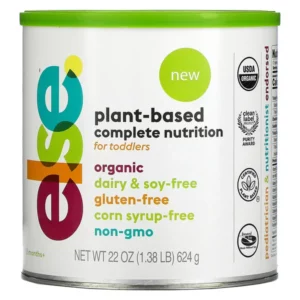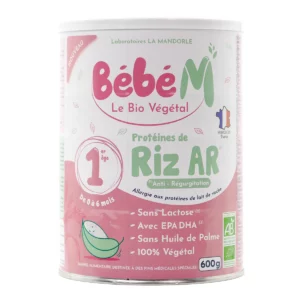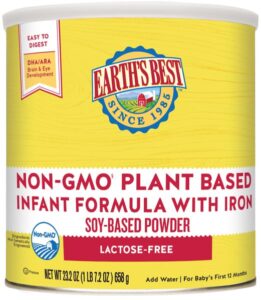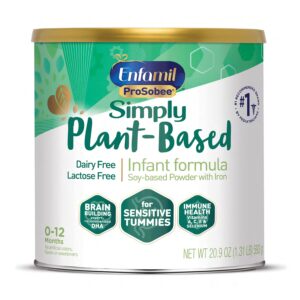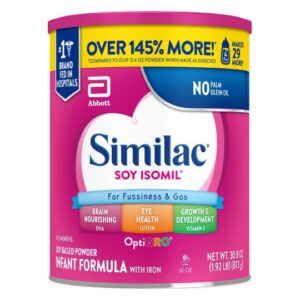Breastfeeding is the best option for your baby during its first 12 months. However, for many reasons, some people are not able to breastfeed. You may also be looking for a perfect follow on milk as you begin to stop breastfeeding. Finding a vegan baby formula to match your ethics whilst still providing optimal health for your child can be a difficult task. However, there are some possible options available to us today.
To help you ensure the perfect start to your child’s life, we have put together a list of the top 5 Vegan Baby Formulas available in 2023. Our picks are all dairy free but most are not labelled vegan due to the animal-derived vitamins they use. We have therefore attempted to gather baby formulas that are as plant-based as possible.
Always make sure to stay in close contact with your doctor about whether a vegan baby formula is appropriate for your child.
Taking a more detailed look into these Vegan Baby Formulas.
Else is the only certified vegan baby formula on the US market. It is only intended for toddlers from 12 months old and up, which makes it perfect for any mothers looking for a formula to supplement their child’s diet during the weaning process.
It contains everything your toddler needs in terms of nutrition (including vitamin D3 in its plant-based form of lichen) but should be used alongside breastmilk and/or solid foods.
It is a soy-free, gluten-free, and organic product, making it perfect for babies with sensitive stomachs as well as giving you peace of mind that you aren’t giving your child any chemically processed ingredients. Else’s vegan nutrition gives your toddler the fundamental nutrition to continue the best possible start to their lives
Bebe is a French brand, which makes purchasing in the US difficult but not impossible as paid delivery is available. Despite this, it is the best option if you require a vegan formula as a substitute for breast milk for your newborn. Their 100% plant-based and organic formula is designed for 3 stages of your child’s development:
- Stage One: 0-6 months
- Stage Two: 6+ months
- Stage Three: 10+ months
The formula uses rice protein and plant-based sources for their vitamins. Bebe does not include any dairy, soy, palm oil, gluten, chemical-based colors or flavors, or synthetic preservatives.
Bebe’s formula is currently quite expensive, especially for those in the US. However, as the only 100% plant-based formula suitable for newborns, we believe it is currently worth the investment for the security of your child’s health.
Allergen advice: Bebe uses almonds in its formula.
Earth’s Best’s Non-GMO soy-based baby formula is designed for infants, with their recommended age range being 0-12 months. The formula meets all the FDA (U.S. Food and Drug Administration) requirements for nutrition in baby formula, making it a great option for those looking to raise their child on formula or in combination with breastmilk from birth.
To comply with FDA regulations, baby formula must include vitamin D3. Vitamin D3 is usually derived from sheep’s wool in the form of lanolin. Earth’s Best does not state where its D3 is from and does not list its product as vegan, so we can assume the D3 in its formula is sourced from an animal.
However, if this is the closest to a 100% plant-based formula that you can acquire, we would recommend it in the name of your child’s health.
Enfamil’s plant-based, dairy-free formula is one of the more mainstream and widely available options on our list. It is a recognizable brand and is recommended by pediatricians. Raising a child can be a very stressful period, and sometimes it helps to be comforted by authorities on the subject.
Enfamil most likely uses animal-sourced D3, making it not strictly vegan, but makes for a very reliable and easy-to-find plant-based option.
Enfamil is also available in liquid and concentrates forms, which makes for a very versatile brand and product to rely on. This along with the wide availability of Enfamil in stores makes the convenience of their plant-based formula hard to argue with.
This dairy-free formula from Similac is intended for babies of 0-12 months who have a dairy sensitivity. It is another widely available choice, coming in both powder and liquid varieties, making it perfect for the hectic schedule of a parent.
This soy formula hits all the nutritional needs of your baby as you would expect from any other regular formula. However, it does contain some added sugar in the form of corn syrup.
The source of the D3 used in Similac is not stated, and most likely animal derived.
Are there Vegan-friendly baby formulas?
There are a few options for plant-based baby formulas, such as ones made with soy proteins and rice proteins. Research is relatively new regarding plant-based baby formulas as their popularity has increased alongside recent general interest and participation in veganism. However, the science is looking promising that if a plant-based baby formula can deliver all the nutritional requirements of a baby then they are appropriate and healthy.
There are currently only a couple of strictly vegan baby formulas available. However, there are many dairy-free and plant-based formulas that are mostly designed for babies with lactose intolerances. Most of these will use vitamin D3 derived from lanolin, which is found in sheep wool meaning they can’t be considered vegan.
Often the producers of these formulas recommend consulting a healthcare professional to assess whether a vegan baby formula is appropriate for your child and we suggest the same. Your child may face certain medical requirements that require closer observation.
What do vegan babies drink instead of milk?
Vegan babies will generally be raised on their mother’s breastmilk for the first 12 months of their lives. Breastfeeding causes no ethical conflict with veganism. However, a parent may still look for a vegan milk or formula alternative. This could be either when they are unable to breastfeed, or as a child grows past breastfeeding and a nutritious milk replacement is desired.
There are some vegan and dairy-free baby formulas available for younger babies under the guidance of a healthcare professional, whilst unsweetened, fortified soya milk makes for a nutritious and go-to option for older children.
At what age can babies be fully vegan?
The American Dietetic Association says that a vegan diet is appropriate for individuals during all stages of the life cycle. This means that babies can be weaned off of breastmilk straight onto nutritionally adequate plant-based foods. As with all diets, care must be taken to make sure these foods meet the nutritional requirements of your child.
It was previously believed that animal products are essential to a healthy human diet, but as the American Dietetic Association states, if it is an appropriately planned plant-based diet, your health can thrive. Of course, any diet (vegan or not) must be appropriately planned to fulfill the nutritional needs of a regular healthy human.
If a child is breastfed until they are weaned onto plant-based solid food then they would be considered to have followed a vegan or plant-based diet their whole lives.
Is plant-based formula better for babies?
A mother’s breastmilk is always best, but if a vegan mother cannot breastfeed then a plant-based formula is a possible alternative.
The adequacy of plant-based baby formulas is still an ongoing conversation. It generally seems that so long as a formula is nutritionally sufficient then plant-based formulas are healthy. However, there is no current evidence to suggest that this is necessarily a better or worse option than regular, animal-derived formula. Of course in certain cases such as lactose intolerances and other allergies, plant-based may be the better option.
Summary
The two best current options for vegan baby formula are Else’s and Bebe’s offerings. This is not without its limitations, with Else’s only being suitable for toddlers, and Bebe’s price when factoring in import costs. Plant-based and vegan baby formula is still fairly new and undergoing research all the time, so hopefully we can see more vegan-approved formulas on the US markets soon enough.
However, if neither of these options is appropriate for you and your child, we recommend using one of the formulas we have listed that are not entirely vegan. Despite these formulas containing animal-derived vitamins, the health of our children should always be the main priority.
